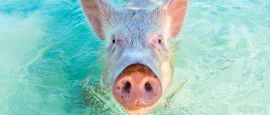Bahamas: Doing business & staying in touch
Doing business in Bahamas
Courtesies follow a similar pattern to the US and UK, ie appointments are made and business cards are exchanged. Business attire is smart-casual, normally trousers or skirt with a collared blouse or shirt. Wait until invited before moving to a first-name basis; whilst extremely friendly, Bahamians are initially more reserved and slower to open up than other Caribbean cultures.
On a 2010 Heritage Foundation Index of Economic Freedom, The Bahamas billed 47th position in the world. A stable, free-market-orientated government has been heavily reliant on tourism for many decades: the tourism industry currently accounts for approximately 60% of GDP. It is tourism and, following a recent boom, real estate, which attracts the eyes of most foreign investors, a trend actively encouraged by the government. Despite an unemployment problem which has grown alongside the steady economic expansion, the outlook overall is a bright one for Bahamians and outside investment alike, and the country is one of the most affluent nations in the Caribbean. Lurking behind tourism in the country’s economic sustenance is the sizeable offshore banking sector (accounting for around 15% of GDP). Recently the financial sector has come under pressure since the Organisation for Economic Cooperation and Development (OECD) instigated a tightening up of monetary laws. Agriculture and fishing account for a mere 5 % of GDP: far lower than other countries in the region. Conference venues can seat from 15 to 3,000 people. Audiovisual equipment available for hire includes: LCD projector and screen, overhead and slide projectors, TVs, VCRs, and CD players, multiple channel mixers and more. Information may be obtained from the Bahamas Tourist Office or the Bahamas Ministry of Tourism in Nassau.
Vehicle parts, hotel, restaurant and medical supplies and electronics. There is also a growing market for products catering to the country’s diverse ethnicity, such as ethnic cosmetics.
Keeping in Touch in Bahamas
Roaming agreements exist with a few international mobile phone companies. Coverage is average. Handsets can be hired locally and prepaid SIM cards are sold.
Many hotels have Internet access and there are plenty of Internet cafes, as well as a few Wi-Fi hotspots. Only 30% of the population is connected, despite growing e-commerce activities.
A US report, entitled Freedom of the Press 2008: A Global Survey of Media Independence, assessed the degree of press freedom in the Bahamas to rank it 37th in the world.
Although the constitution of the Bahamas guarantees press freedom, pressure has been applied to the media in the past. Newspapers and magazines are mostly privately owned with the government operating a radio network. It also runs the island's only TV service.
• The four daily newspapers are The Bahama Journal, Freeport News, The Nassau Guardian, and The Tribune.
• The Punch is published twice a week.
• Both Bahamas Tourist News and What's On Magazine are printed once a month.
• International newspapers are available.
• The government-owned, commercially-run Broadcasting Corporation of the Bahamas (BCB) - the only television network on the islands - operates ZNS Bahamas.








 You know where
You know where